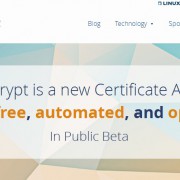ssl Archive

Let’s Encrypt vulnerability discovered in ACME
Let’s Encrypt is a new Certificate Authority that it’s free, automated and open. Currently in Public Beta, Let’s Encrypt is a new step forward for better security and privacy. Let’s Encrypt team wants HTTPS to become the default. Everyone can own free SSL certificates signed by Let’s

Superfish: Lenovo is only the tip of the iceberg
In Malware
Security experts from G Data SecurityLabs analyzed Superfish adware. In this process, analysts have encountered in program, a technology component, called SSL digestion. It uses a root certificate which is poorly secured and has extensive rights on the computer. SSL Digestor intercept safe HTTPS connections which can be decrypted.

How to protect against Black Friday scams and fake deals
If you are shopping online on Black Friday you must pay attention to the following tips. They could save you from being fooled and they can help you to not lose money. Before everything else, install an antivirus with online security, and, if you have a little

The POODLE bug, SSL v3 vulnerability
Google discovered a new OpenSSL vulnerability and described it on it’s online security blog. This SSL bug is called POODLE (Padding Oracle On downgraded Legacy Encryption). The Poodle attack will allow hackers to steal your browser’s “secure” HTTP cookies and other bearer tokens such as HTTPS Authorization

Google encourages all website owners to switch from HTTP to HTTPS for a better ranking position in the search engine
Google announced on it’s Official Webmaster Central Blog that “Security is a top priority for Google”. Google invests more in making sure that it’s services use “industry-leading security”, just like Secure HyperText Transfer Protocol (HTTPS) encryption. People using Search, Gmail and Google Drive, for example, automatically have

Heartbleed security bug in OpenSSL affected over a half of the internet
Heartbleed bug was discovered in OpenSSL. OpenSSL is an open-source implementation of the SSL and TLS protocols. The core library is written in the C programming language. OpenSSL implements the basic cryptographic functions and provides various utility functions. This bug allows random reading of servers memory in
